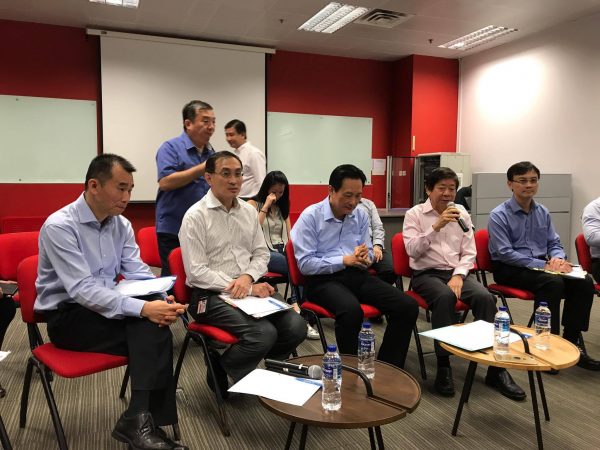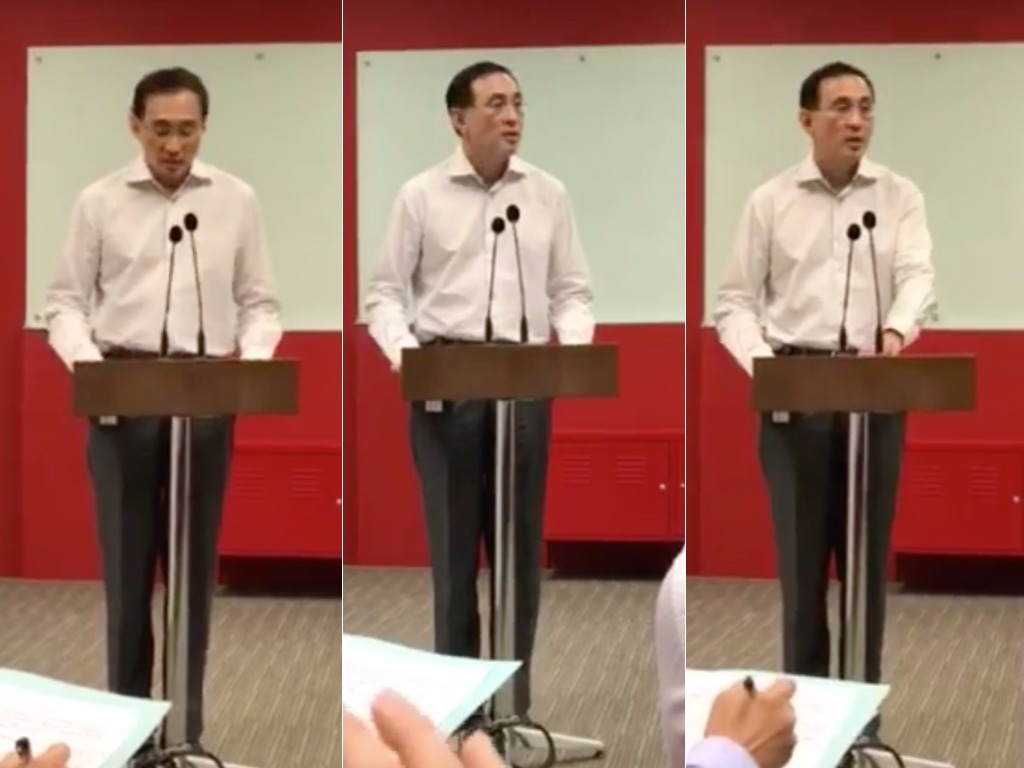During the press conference on Monday, Oct. 16, to address the flooding of the North-South Line, SMRT President and Group CEO Desmond Kuek referred to his ongoing quest to change the company culture at SMRT.
"There has been criticism about SMRT’s work culture. Indeed, many of our major disruptions in the past have been attributed, in some part, or all, to human error or failure. We regret that this is so.
Much progress has been made with the inculcation of a positive work culture, but there remain some deep-seated cultural issues within the company that has needed more time than anticipated to root out."
Five minutes may seem a long time for an impatient Singaporean commuter to wait for his or her train.
But five years as a CEO is definitely a long enough time for one to be able to effect change, and a change in culture in the company.
To put things in context, five years is an election cycle, and more than one term as a US President.
All the SMRT president's men (and women)
In his speech, Kuek said that staff strength increased from "3,500 in 2012 to 5,300 today, with nearly triple the number of engineers to nearly 500 now".
In other words, more than one-third of SMRT staff was hired during Kuek's CEO term.
[related_story]
Take his 15-member senior management team for example.
Among the 14 members of Kuek's SMRT senior management team, a majority of them (10 out of 14) joined SMRT after he became the CEO.
2013
2. Chief Executive Officer, Trains;
4. Managing Director for SMRT Buses and Roads Services;
5. Managing Director, International;
6. Vice President, Legal & Corporate Secretariat;
7. Head, SMRT Safety & Inspectorate
2014
8. Managing Director, Singapore Rail Engineering
2015
9. Managing Director, Services and Vice President, Strategic Relations Office
2016
Hence, it's puzzling that Kuek highlighted that more improvement can be made with SMRT's work culture and that there remain "some deep-seated cultural issues within the company" that needed more time than anticipated to root out.
Why? Because Kuek hired more than 70 percent of his leaders, with more than one-third of the staff hired during his CEO stint.
New boss, old problems?
In Oct. 2012, Kuek replaced Saw Phaik Hwa, who resigned in the beginning of 2012, a month after two major train breakdowns occurred in Dec. 2011.
The disruption was so severe that a Committee of Inquiry was formed to investigate it and SMRT was eventually fined S$2 million.
In a 2013 interview, Kuek emphasised that SMRT needed to learn from "past mistakes."
"Over the past couple of years, the company has got through a couple of bad patches, as a company we have resolved to learn all those past mistakes and we will benchmark ourselves with the best in class in the world."
After taking over from Saw, he sent out a company-wide email asking for feedback.
"The common threads in the responses are that we needed to improve on our preventive maintenance regimen, that a lot of HR policies needed to be reviewed, that our processes needed to be made more efficient and streamlined."
Personal accountability
In the span of time between the flood of the North-South line on Oct. 7 and the press conference on Oct. 16, neither Kuek nor anyone SMRT commented on the cause of the flood, or the recovery work being done.
Kuek appeared after nine days, but it was together with a praetorian guard of other men, including SMRT Chairman Seah Moon Ming, SMRT CEO (Trains) Lee Ling Wee, LTA Chief Executive Ngien Hoon Ping, and Minister for Transport Khaw Boon Wan.
 Photo by Sulaiman Daud.
Photo by Sulaiman Daud.
Yes, Kuek, together with Khaw and Seah apologised.
But it was Seah, who recently became chairman this year, and has a non-executive role in the company, who bowed in apology.
Kuek has been personally affected before by SMRT's stumbles. In 2016, he received a renumeration of S$1.87 million instead of $2.31 million -- a substantial pay cut of nearly 20 percent.
But for this most recent disruption, it was revealed that only the maintenance team for Bishan MRT station would have their bonuses cut.
The buck stops where
US President Harry Truman once had a sign on his desk that said, "The buck stops here". Unlike others who passed the buck around, he had to accept the ultimate responsibility for his decisions.
Granted, Khaw said that he preferred a less adversarial relationship between the operator and the regulator, with everyone working together to resolve the issue.
Khaw has a point for such a preference -- a blame culture will undoubtedly affect the morale of the rank-and-file SMRT staff.
In fact, one cannot help but think that Khaw is now a one-man cheer-leading machine, rallying the SMRT staff in his late night visits and accepting responsibility for the latest train disruptions.
In the briefing, Khaw also stressed the importance of “troop morale” in battle, saying “no amount of weaponry and good leadership can win the war” if those on the ground are demoralised.Hence, this is counter-productive if a leader of the company, while apologising and accepting responsibility, decided to shift part of the blame to a culture that surely he and his management team is responsible for.
In fact, Kuek can learn from some CEOs overseas, who have accepted symbolic salaries of one buck, like the late Steve Jobs of Apple and Lyndon Rive of SolarCity, to show solidarity with their employees.
Nevertheless, most of the commuters know where the buck stops.
The easy route for Kuek and his management team to take, of course, is to give up and (gasps) resign.
But this is Kuek's team. It is his team's duty and responsibility to motivate and inspire the one in ten of the SMRT's staff (which is about 530 SMRT staff) who are not as "committed, professional and commuter focused".
Commuters are tired of apologies.
After five years, it is time for Kuek and his team to apologise less and deliver more, so that Singaporeans can enjoy "a world-class transport service and lifestyle experience that is safe, reliable, and customer-centric".
And hopefully, he will also leave his successors with the legacy of a better "work culture" in SMRT.
Related stories:
LTA-SMRT press con: 7 quotes from Transport Minister Khaw Boon Wan too epic not to share
Here’s how SMRT’s failsafe measures failed during the North-South line flood
SMRT apologises: Couldn’t someone have spoken in the past 9 days?
SMRT CEO Desmond Kuek breaks silence, addresses public
Top image by Sulaiman Daud
Here are some totally unrelated but equally interesting stories:
HDB things we are so used to now but will probably not miss in 10 years’ time
Which of these cool young Singaporeans would you want your kid to grow up to be?
<a href="http://ho.lazada.sg/SHSB10?file_id=169680" target="_blank"><img src="https://media.go2speed.org/brand/files/lazada/6907/SG_WK41_TBCBS_728x90.jpg" width="728" height="90" border="0" /></a><img src="http://ho.lazada.sg/aff_i?offer_id=6907&file_id=169680&aff_id=193369" width="1" height="1" />
If you like what you read, follow us on Facebook, Instagram, Twitter and Telegram to get the latest updates.
